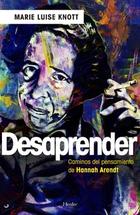
In this lucid essay on the thought and person of Hannah Arendt, Marie Luise Knott explores the strategies used to achieve this philosopher intellectual freedom in the historical context in which he lived. According Knott, in the heart of his controversial theory about the banality of evil lies a vision very different from that of his contemporaries, that no one before had dared to explore the world.
In his effort to transcend the old philosophical and cultural patterns that had degenerated into horror and shown their sterility, Arendt prepared to "unlearn" to see things from a totally new perspective and thus conquer new land of freedom. For this he traveled new paths of thought that Knott analyzes in four actions: laugh, translate, forgive and dramatize.








